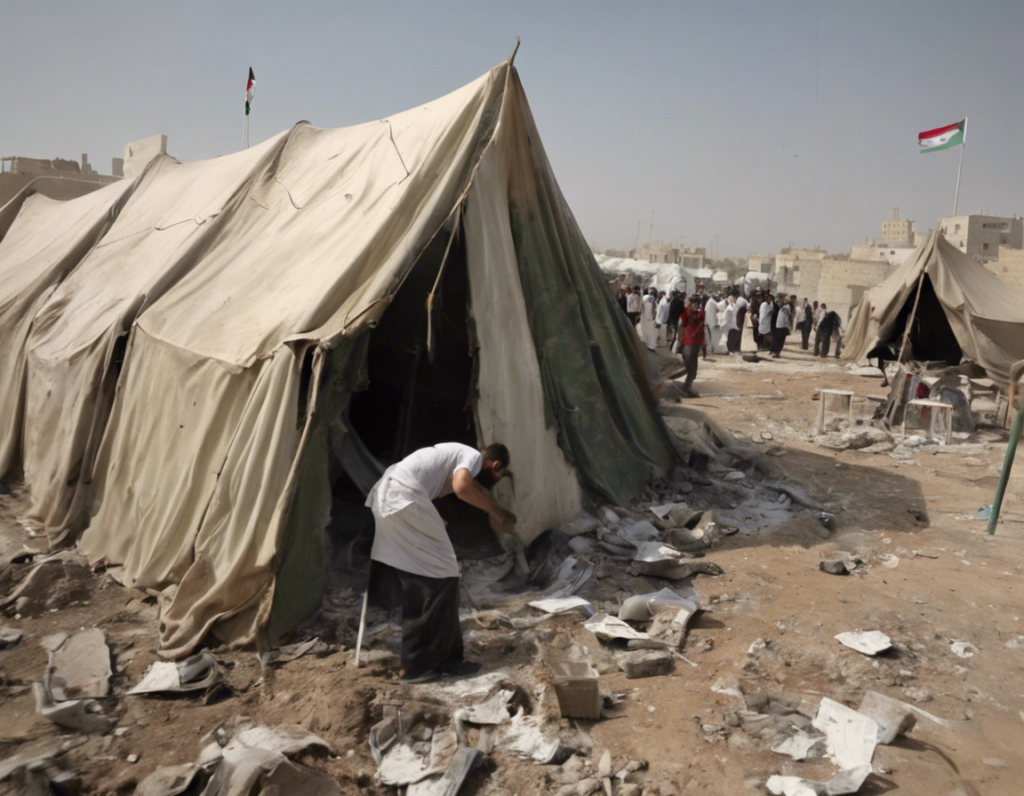On August 19, 1952, one of the most tragic and devastating events in Egyptian history took place – the Rafah Tent Massacre. This brutal incident occurred during the ongoing conflict in the Palestinian refugee camps of the Gaza Strip. The Rafah Tent Massacre left an indelible mark on the collective memory of the Egyptian people and the wider Arab world, serving as a stark reminder of the horrors of war and the suffering of innocent civilians caught in the crossfire.
The Historical Context
To understand the significance of the Rafah Tent Massacre, one must first delve into the historical context in which it occurred. In the aftermath of the 1948 Arab-Israeli War, hundreds of thousands of Palestinian refugees were displaced from their homes and forced to seek shelter in neighboring countries, including Egypt. The establishment of Palestinian refugee camps in the Gaza Strip and other parts of the region created a volatile and dire humanitarian situation, with overcrowded living conditions and limited access to basic necessities.
The Tragedy Unfolds
The Rafah Tent Massacre unfolded against this backdrop of turmoil and suffering. On that fateful day in August 1952, Egyptian security forces launched a military operation in the Rafah refugee camp, targeting suspected infiltrators and militants. However, the operation quickly spiraled out of control, leading to widespread chaos and violence. Hundreds of innocent Palestinian civilians, including women, children, and the elderly, were caught in the crossfire and mercilessly killed in the brutal crackdown.
The Aftermath and Legacy
The aftermath of the Rafah Tent Massacre was marked by shock, grief, and anger. The senseless loss of life and the suffering of the Palestinian refugees sent shockwaves throughout the Arab world and drew condemnation from the international community. The massacre left a lasting legacy, serving as a poignant symbol of the injustices faced by the Palestinian people and the need for a just and lasting solution to the Israeli-Palestinian conflict.
Commemorating the Victims
In the decades since the Rafah Tent Massacre, efforts have been made to commemorate the victims and honor their memory. Memorials, exhibitions, and ceremonies have been held to ensure that the tragic events of that day are not forgotten and to highlight the ongoing struggle for justice and peace in the region. The memory of the Rafah Tent Massacre serves as a stark reminder of the human cost of war and the urgent need for a resolution to the Israeli-Palestinian conflict.
The Quest for Justice
The quest for justice for the victims of the Rafah Tent Massacre continues to this day. Calls for accountability, reparations, and recognition of the crimes committed have been echoed by human rights organizations, activists, and governments around the world. The pursuit of justice for the victims is seen as a crucial step towards healing the wounds of the past and building a better future for the Palestinian people.
Conclusion
The Rafah Tent Massacre stands as a tragic chapter in the history of the Palestinian people and a stark reminder of the human cost of conflict and war. As we remember the victims of this senseless tragedy, we must also reaffirm our commitment to justice, peace, and reconciliation in the region. Only through a collective effort to address the root causes of injustice and violence can we hope to prevent such tragedies from recurring in the future.
Frequently Asked Questions
1. What led to the Rafah Tent Massacre?
The Rafah Tent Massacre was the result of a military operation by Egyptian security forces in the Rafah refugee camp, targeting suspected infiltrators and militants. The operation quickly escalated into a brutal crackdown, resulting in the deaths of hundreds of innocent Palestinian civilians.
2. How did the international community respond to the Rafah Tent Massacre?
The Rafah Tent Massacre drew condemnation from the international community, with many countries and human rights organizations expressing outrage at the senseless loss of life. Calls for justice and accountability for the perpetrators of the massacre were echoed by various governments and organizations.
3. What is the significance of commemorating the victims of the Rafah Tent Massacre?
Commemorating the victims of the Rafah Tent Massacre is important to ensure that the tragic events of that day are not forgotten and to honor the memory of the innocent civilians who lost their lives. It also serves as a reminder of the ongoing struggle for justice and peace in the Israeli-Palestinian conflict.
4. How has the legacy of the Rafah Tent Massacre impacted the Palestinian people?
The legacy of the Rafah Tent Massacre has had a profound impact on the Palestinian people, serving as a poignant reminder of the injustices they have faced and the need for a just and lasting solution to the conflict. It has galvanized efforts to seek justice for the victims and to address the root causes of violence and displacement in the region.
5. What can be done to prevent similar tragedies in the future?
Preventing similar tragedies in the future requires a collective effort to address the root causes of conflict, violence, and displacement in the region. This includes promoting dialogue, reconciliation, and respect for human rights, as well as working towards a just and lasting resolution to the Israeli-Palestinian conflict.
